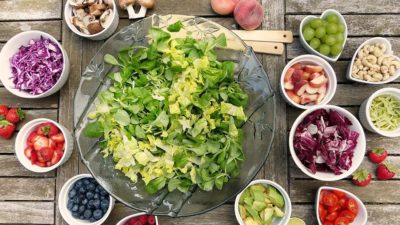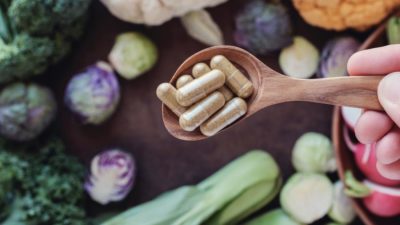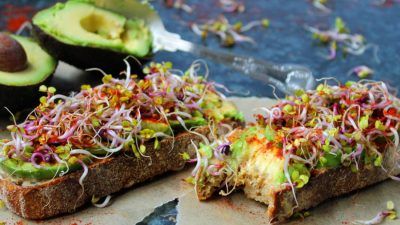Mini factsheet: Vitamin B12

Everyone needs a regular source of vitamin B12 and for vegans, this means a supplement
Why do we need it?
Vitamin B12 helps make red blood cells and keeps our nervous system healthy. If you lack vitamin B12 you could suffer from vitamin B12 anaemia – when your red blood cells aren’t able to carry oxygen around your body properly. Also a lack of B12 damages the myelin sheath which wraps around our nerves – so deficiency is frequently associated with neurological problems.
How much do we need?
Viva! recommends that you take a daily B12 supplement providing at least 50 micrograms per day, or one weekly supplement providing 2,000 micrograms. Official recommendations are significantly lower; 1.5 micrograms in the UK, 2.4 micrograms in the US and 4.0 micrograms in Europe (EFSA). A microgram is a millionth of a gram so we need only a tiny amount – but getting that small amount is vital.
Deficiency
Deficiency can cause serious problems – especially in the young. Symptoms include: extreme tiredness, lack of energy, pins and needles, muscle weakness, depression and problems with memory, understanding and judgement. It can lead to raised levels of a substance called homocysteine, which can increase the risk of heart disease and stroke. B12 levels can easily be checked by your doctor and any deficiency can be treated with supplements or a course of injections.
What’s the beef with B12?
B12 is naturally produced by certain bacteria found in soil and water or grown in vats for supplements. Traditionally, people and animals got B12 from eating food from the ground and drinking non-treated water but with so many farmed animals now confined in factory farms, they are fed B12 supplements. So it makes no sense that you need meat or dairy foods for B12 – cut out the middleman and take a supplement yourself!
Absorption, a tricky issue
B12 absorption is a complicated process that declines with age and B12 in meat and dairy is bound to animal protein, making it even harder to absorb. Low levels (regardless of diet) are not uncommon, especially in older people. In the UK, six per cent of people under 60 and 20 per cent of those over 60 are deficient and in the US, everyone over 50 is advised to take a supplement. Absorption can be inhibited by poorly functioning kidneys, cigarette smoke, nitrous oxide used for anaesthesia, heating food in a microwave or cooker and some medications, including Metformin (for diabetes), anticonvulsants and proton pump inhibitors (PPI’s).
Too much of a good thing?
Vitamin B12 is water-soluble so if you take too much, it simply comes out in your urine. Guidelines say that up to 2,000 micrograms a day is unlikely to cause problems, so you shouldn’t take more than that.
There are two main forms of B12:
- Cyanocobalamin is a cheap and stable form of B12 used in most fortified foods and supplements – suitable for most people.
- Methylcobalamin is an ‘active’ form of vitamin B12. It costs more as it is not so stable – recommended for smokers and people with kidney problems.
The best food sources include yeast extract (Marmite/Vegemite), nutritional yeast flakes with B12, B12-fortified vegan milks, B12-fortified breakfast cereals and B12-fortified margarine. Fermented soya foods and seaweeds don’t provide a reliable source of B12.
All vegans, and everyone over 50, should take a supplement – and there’s no reason not to.
A well-planned, varied vegan diet, including B12 fortified foods and regular supplements, not only will meet your requirements but provide a healthier source than meat or dairy, setting you up for a healthy old age.
This post has been categorised in: All Print Materials, Mini factsheets










